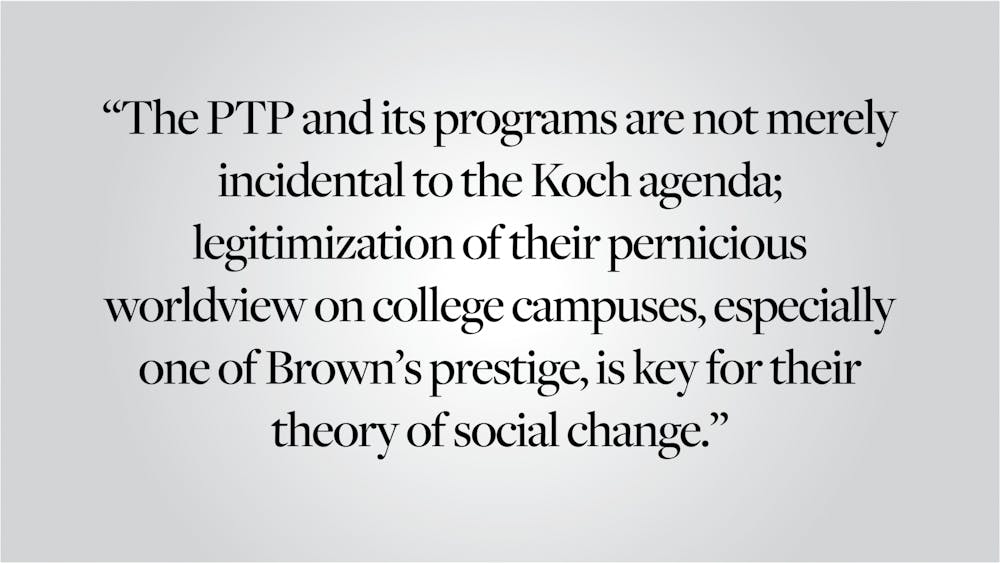Every year, the network of donors convened by billionaire industrialist Charles Koch spends millions of dollars on universities, think tanks, policy groups and politicians to promote a worldview that is anti-science and anti-democratic. Between 1997 and 2018, Koch Family Foundations have spent nearly $150 million on groups that attack climate change science and policy solutions. Their network of wealthy donors has funneled significant funding into political campaigns and recently has opposed any reforms to expand voting and ensure fair elections. They have also donated millions of dollars to fund the Political Theory Project at Brown since its 2003 founding. The PTP and its programs are not merely incidental to the Koch agenda; legitimization of their pernicious worldview on college campuses, especially one of Brown’s prestige, is key for their theory of social change. As such, I call upon students, faculty, alumni and the administration to reject the current proposal to expand the PTP into a Philosophy, Politics and Economics Center, and to address the existing donor influence on the PTP.
Donors in the Koch network explicitly intend to change the ideologies of university students. A 2015 grant proposal from the John Templeton Foundation-funded Philosophy, Politics and Economics of Freedom program at the University of Arizona promised to create a national “PPE Network” that would span “three continents and at least eight universities,” one of which was Brown University. They described one pilot program at Ormond College in Melbourne, Australia that expected “students to begin the course with 60% believing that wage floors create prosperity, and (hoped) to have less than 50% saying that they do by the end of the course.” Additionally, the proposal predicted “75% of students to believe at the beginning of the course that government work programs create prosperity” and aimed to “have less than 60% say that they do so by the end of the course.” This overt attempt to persuade rather than foster inquiry is a blatant attack on academic freedom and should not be welcome on our campus.
I was a member of the PTP-sponsored Philosophy, Politics and Economics Society during my first year at Brown, and I can attest that the PTP’s mission to promote “methodological and viewpoint diversity” is more complicated than it may seem. Each member of the PPE Society receives a $500 dollar fellowship per semester to partake in a bi-weekly reading group. The $500 fellowship is more than just a bonus. I’ve seen firsthand that this money lures students to the table that may not otherwise partake in a reading group on political theory while also encouraging engagement with a specific ideology.
Leaked recordings show that the Koch network uses academic programs to recruit “the most passionate students” as part of a “talent pipeline” where Koch-backed academics are “training the next generation of the freedom movement.” Even if students don’t agree with Friedrich Hayek or Austrian economics, these courses grant ideologies supported by the Koch network legitimacy on college campuses. This ruse has an almost fifty-year history; in 1974, Charles Koch stated that “the educational route is both the most vital and the most neglected” in terms of maximizing a donor’s political impact.
This legitimization runs deeper than just the students: faculty and academics are key, too. An internal document from the Institute for Humane Studies, a nonprofit where Charles Koch is chairman emeritus, confirms just this: “IHS has long identified faculty as a key ingredient in our recipe for social change … But the pace of growth in our academic pipeline is too slow to realize the magnitude of change we seek.” It even goes so far as to say, “imagine, for example, what our graduate student-support capability might look like if hundreds of trusted faculty at PhD-granting institutions acted as our agents.” This language is coming from a group that has worked directly with the PTP and its faculty.
The PTP brings academics to Brown through the semi-annual Janus Forum, which “provides two established researchers with alternative perspectives the opportunity to present their research in direct dialogue with one another.” While this sounds like a great program in theory, it is more complicated in reality. An example of this includes the Spring 2021 debate between Sanford Levinson and Scott Douglas Gerber, both of whom are contributors to the Federalist Society, which has long received Koch money. Another example is the Fall 2013 debate between Steven Calabresi, a contributor to the Cato Institute founded by Charles Koch, and Stuart Taylor, Jr., a board member of the American Council of Trustees and Alumni, which has also received Koch support.
This is inexcusable for a group that claims to promote viewpoint diversity. I’m not saying that it is inherently wrong to invite academics with Koch network connections to campus, but the large number of invited academics with such connections raises questions about how invited academics are selected.
I did not come to Brown to study at an institution that promotes the presence of the Koch anti-science, anti-democratic ideology. While the proposal for the PPE Center is set for further discussion at a February faculty meeting, students play a vital role in opposing the proposal. Convincing the administration that Koch money has no home at Brown requires a collective effort. Thus, I implore students, faculty and members of the Brown community to request that Provost Richard Locke P’18 and President Christina Paxson P’19 address the donor influence problems posed by the PTP and reject its expansion into a center that would touch more academic departments.
Ethan Drake ’24 can be reached at ethan_drake@brown.edu. Please send responses to this opinion to letters@browndailyherald.com and other op-eds to opinions@browndailyherald.com.





